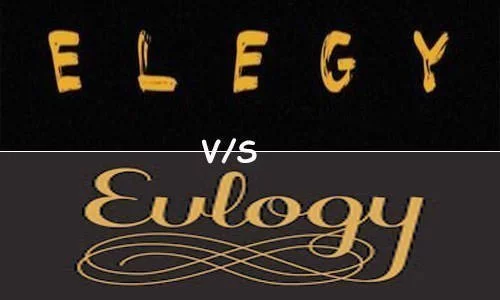Elegy and eulogy have entirely different meanings but still the words are often confused with each other. Here we discuss them in detail so that you don’t make a mistake when you use them.
| ELEGY | EULOGY |
Meaning |
|
| A mournful poem or couplet (a pair of successive lines of verse that rhyme and are of the same length) which laments the death of a person. | A speech or an essay written in honour of a deceased person. |
Literary Form |
|
| Poetry | Prose |
Etymology |
|
| Elegy originated from Greek and Latin and is related to elegos: “poem or song of lament.” | Eulogy comes from Greek eulogia “praise; good or fine language,” from eu “well” + -logia “speaking” |
Modern Usage |
|
| The term elegy is used for a poem, couplet or song which is written after the death of someone. It is usually written just after the death of the person but may be written years later too. The tone of an elegy is usually sad expressing remorse for the loss of the deceased person. | Eulogy is a speech or a written piece which is orated at the funeral or published soon after the death of the person. In contrast to elegy, a eulogy usually doesn’t mourn the loss of the deceased but rather honours that person by expressing respect and praising the deeds he/she did while he/she was alive. |
Sentence |
|
| After the death of his grandfather he spent days alone in his farmhouse writing elegies to vent his sorrow. | The eulogy he read at the funeral brought back memories of Sam and I was moved to tears. |
May also refer to |
|
|
|

